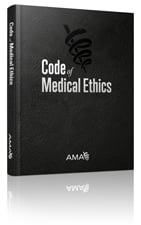With the dawn of a midterm election year and major issues affecting the nation’s health system on the agenda, questions arise about the role physicians should play in discussing political topics with patients.
In a recent JAMA opinion essay, Harvard Medical School Professor Jerry Avorn, MD, argued that “a strong case can be made that rather than being a taboo subject, discussing transformational changes in health care coverage with patients could be seen as a core responsibility of all clinicians—physicians, nurses, pharmacists, therapists.”
Such communications are “necessary to ensure the capacity of health care professionals to continue to provide patients with the health care they seek from us,” he added. “The intimate connection between coverage and clinical care also offers a direct and unassailable way to communicate this information.”
The AMA Code of Medical Ethics has guidance for physicians on this sensitive issue.
What the Code says
In Opinion 2.3.4, “Political Communications,” the Code explains:
Physicians enjoy the rights and privileges of free speech shared by all Americans. It is laudable for physicians to run for political office; to lobby for political positions, parties or candidates; and in every other way to exercise the full scope of their political rights as citizens. Physicians may exercise these rights individually or through involvement with professional societies and political action committees or other organizations.
When physicians wish to express their personal political views to a patient or a patient’s family, the physician must be sensitive to the imbalance of power in the patient-physician relationship, as well as to the patient’s vulnerability and desire for privacy. Physicians should refrain from initiating political conversations during the clinical encounter.
Physicians must not allow differences with the patient or family about political matters to interfere with the delivery of professional care.
When expressing political views to a patient or a patient’s family, physicians should:
(a) Judge both the intrusiveness of the discussion and the patient’s level of comfort before initiating such a discussion.
(b) Discuss political matters only in contexts where conversation with the patient or family about social, civic or recreational matters is acceptable.
(c) Refrain from conversation about political matters when the patient or family is emotionally pressured by significant medical circumstances.
(d) Work towards and advocate for the reform and proper administration of laws related to health care. Physicians should stay well informed of current political questions regarding needed and proposed reforms.
(e) Stay well informed about needed or proposed policies concerning health care access and quality, medical research and promoting public health so as to be able to advocate for patients’ needs.
More go-to guidance
The AMA Code of Medical Ethics also offers guidance on other aspects of patient-physician relationships, such as political action by physicians, gifts from patients and physician exercise of conscience.
A continuing medical education module incorporates animation, infographics and scenario-based learning to help physicians identify and understand how to maintain proper boundaries with their patients and to articulate and understand the underlying importance of those boundaries to the practice of medicine. The AMA has designated this enduring activity for 1 AMA PRA Category 1 Credit™.
The AMA Code of Medical Ethics is updated periodically to address the changing conditions of medicine. The new edition is the culmination of an eight-year project to comprehensively review, update and reorganize guidance to ensure that the Code remains timely and easy to use for physicians in teaching and in practice.





